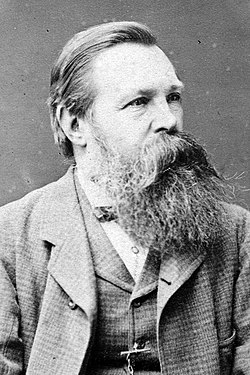
Back Friedrich Engels Afrikaans ፍሬድሪክ ኤንግልስ Amharic Friedrich Engels AN فريدريك إنجلز Arabic فريدريك انجلز ARZ ফ্ৰিড্ৰিচ এংগেল্ছ Assamese Friedrich Engels AST Fridrix Engels Azerbaijani فردریش اینگلس AZB Фридрих Энгельс Bashkir
Friedrich Engels | |
|---|---|
 Engels in 1879 | |
| Born | 28 November 1820 |
| Died | 5 August 1895 (aged 74) London, England |
| Education | Gymnasium zu Elberfeld (withdrew)[1] University of Berlin (withdrew)[1] |
| Notable work | |
| Political party |
|
| Spouse | |
| Partner | Mary Burns (died 1863) |
| Philosophical work | |
| Era | 19th-century philosophy |
| Region | Western philosophy |
| School | |
| Main interests | |
| Notable ideas | |
| Signature | |
 | |
Friedrich Engels[a] (/ˈɛŋɡəlz/ ENG-gəlz;[3][4][5] German: [ˈfʁiːdʁɪç ˈɛŋl̩s]; 28 November 1820 – 5 August 1895) was a German philosopher, political theorist, journalist, and revolutionary socialist. He was also a businessman and Karl Marx's lifelong friend and closest collaborator, serving as the co-founder of Marxism.
Born in Barmen in the Kingdom of Prussia, Engels was the son of a wealthy textile manufacturer. Despite his bourgeois background, he became a staunch critic of capitalism, influenced by his observations of industrial working conditions in Manchester, England, as published in his early work The Condition of the Working Class in England (1845). He met Marx in 1844, after which they jointly authored works including The Holy Family (1844), The German Ideology (written 1846), and The Communist Manifesto (1848), and worked as political activists in the Communist League and First International. Engels also supported Marx financially for much of his life, enabling him to continue his writing in London. After Marx's death in 1883, Engels edited from his manuscripts to complete Volumes II and III of his work Das Kapital (1885 and 1894).
Engels' own works, including Anti-Dühring (1878), Socialism: Utopian and Scientific (1880), Dialectics of Nature (written 1872–1882), The Origin of the Family, Private Property and the State (1884), and Ludwig Feuerbach and the End of Classical German Philosophy (1886), are foundational to Marxist theory.
- ^ a b Norman Levine, Divergent Paths: The Hegelian Foundations of Marx's Method, Lexington Books, 2006, p. 92: "the Young never graduated from the gymnasium, never went to university..."
- ^ For the English use of "Frederick Engels" see for instance: Biographies of Marx and Engels at marxists.org
- ^ Wells, John (3 April 2008). Longman Pronunciation Dictionary (3rd ed.). Pearson Longman. ISBN 978-1-4058-8118-0.
- ^ "Engels". Random House Webster's Unabridged Dictionary.
- ^ Merriam-Webster, Engels.
Cite error: There are <ref group=lower-alpha> tags or {{efn}} templates on this page, but the references will not show without a {{reflist|group=lower-alpha}} template or {{notelist}} template (see the help page).
© MMXXIII Rich X Search. We shall prevail. All rights reserved. Rich X Search